Following the massive Women’s March and the surprising partial success of protests against Trump’s immigration ban, many feel that the logical step is to escalate. Seize the momentum, put more pressure on the administration, disrupt and paralyze as much as possible. I feel it myself. There are ways in which there is more possibility in the air than there has been in a long time, and Trump has wasted little time going about his authoritarian business.
That, no doubt, is the reason why the idea of calling for a general strike – a general national strike – has caught the imagination over the past few days. After Francine Prose put the idea out in the Guardian, it spread rapidly throughout social media, and split into multiple proposals and counter-proposals.
Some, including Prose herself, see themselves carrying on in a venerable tradition of mass social disruption. But, as much as these proposals look like a natural response to the moment, they are severely disconnected from reality. Calling for a general strike now bears no relation to what mass strikes have meant in the past. The flight from reality shows up in activists’ blasé attitude to history and their very distant relationship to the working class.
The United States has the most violent labor history of any major industrial country. General and other large-scale strikes in the US have nearly always been met with major repression, from police, National Guard, even federal troops. For instance, the general strike in San Francisco of 1934, which developed out of a longshoremen’s strike, led to running battles with the police and a number of deaths.
Running battles on San Francisco’s EmbarcaderoÂ

National Guardsmen set up machine gun nests and tanks for strike suppression
The massive strikes in the period of 1919-1922, involving more than 1 million workers in industries like railroads, steel and mining, were met with enormous violence. One of the most famous is the coal mining wars, which culminated in the Battle for Blair Mountain. It pitted armed and organized miners against a private militia, federal troops, bombing runs by employer-hired aircraft, and some of the first post-war uses of military planes. Hundreds of miners died in the battles.
Rifles collected from defeated miners
During the Ludlow Massacre, National Guardsmen mounted a machine gun on a train, and mowed down strikers and their families living in tents.
During the massive Pullman Strike of 1894, during which Socialist Party leader Eugene Debs was arrested, hundreds of thousands of workers went on strike, and the Attorney General carpeted every state from Illinois to California with injunctions and martial law. Federal troops aided local police and private guards to suppress the strike.
Federal troops guarding a train during Pullman
We can tell similar stories for the suppression of the Great Strike of 1877, which included a general strike in St. Louis; for the strike wave of 1886; for the Lawrence strike of 1912; for the Little Steel Strike, Harland County strikes, the Auto-Lite Strike, the Minneapolis strike, and the textile strikes of the 1930s; and so on and so forth.
This isn’t just distant history.
On March 10, 1968, Martin Luther King Jr. addressed SEIU Local 1199, a radical local of drugstore and hospital workers, and spoke about the need for organizing the unorganized and for a trans-racial class alliance against exploitation and imperialism. Turning his attention to African-American sanitation workers striking in Memphis, Tennessee, he said, “You may have to escalate the struggle a bit….just have a general work stoppage in the city of Memphis.” Less than a month after calling for a citywide general strike, King was assassinated in that very city.
National Guardsmen at the Memphis Strike
The Phelps-Dodge strike of 1983 pitted local miners against riot police.

Tear gas and cops at Phelps-Dodge
During the Hormel Strike of 1984-5 in Austin, MN the National Guard helped local police forces suspend civil liberties, impose deeply oppressive labor law, and undermine the strike.
The National Guard helping break the Hormel Strike
The 1990 Justice for Janitors campaign was not exactly peaceful.
The more seriously disruptive the strikes, the more dangerous they are. It is no doubt true that the American state has reduced its readiness to violently repress workers. But even that is as much a function of the decline in worker militancy itself as it is a more tolerant view of major strikes.
Even when not violent or repressed, strikes are serious business. They are often lost, and if strikers aren’t injured they can lose their jobs, friends, and even families. The law is pitted heavily against workers – they can be replaced, they lose free speech rights when at work, even the whiff of strike activity allows employers to shut down the entire factory, and legal protections of workers are poorly enforced. The police and the rest of the security apparatus are usually happy to enforce that law, and there is often no way for workers to carry out a proper strike without breaking those laws. To the degree we have forgotten this, it is because worker militancy has declined, strike rates are way down, and union memberships have dwindled into the low single-digits.
In the past, workers stayed out on those strikes, even fighting the state, in part because of dense, historically developed, cultures of solidarity; established traditions of militancy; organized, if not always recognized, unions; and long connections with left-wing organizers. These days, the appetite for fighting the state is next to nil, there is no tested public sympathy for labor actions, and there are no clear organizations standing ready to lead.
If you’re going to ask people not just to risk losing their jobs but potentially face the armed apparatus of the state, there had better be preparation, leadership, and some evident readiness for mass labor actions.
Not to mention, there had better be a recognizable goal. But what is the point of the proposed general strike? To say down with Trump? What, so we can have Pence?
Or is the point just a generalized ‘No’? A massive expression of discontent? None of the significant costs of a general strike are worth it if it’s just a grand gesture of refusal.
On one version, the point of the strike is to affirm a grab-bag of demands: no to the immigration ban, yes to universal health care, no to pipelines, no to global gag rule and, inexplicably, a final demand that Trump reveal his tax returns. These demands show no evidence of thinking about what the immediate interests of workers might actually be – no mention of proposed national right-to-work legislation, $15 minimum wage demands, or even Trump’s terrible Labor Secretary pick. Trump’s nationalist and deeply inegalitarian economic ‘plan’ at least acknowledges the need to address bad employment prospects and stagnant wages.
It would be reasonable for workers to dismiss the call for a general strike. It looks like they are being asked to be actors in someone else’s drama, by people who just cottoned on to the fact that things are shitty out there.
Moreover, even moderately effective general strikes don’t emerge, willy-nilly, like miraculous interventions into national life. They are intensifications and radicalizations of already existing patterns of resistance by the working class. This demand for a general strike looks less like that intensification and more like an attempt to leapfrog all the hard, long-term political work that goes before.
At least some of those arguing for the general strike seem to sense that there is an element of bad faith here. For instance, Francine Prose added the qualification, which I have seen repeated in a number of places, that only those “who can do so without being fired” should go on strike. This must be the first time someone called for a general strike but exempted most of the working class.
Believe me, I’d love to see a real general strike, a serious attempt at restructuring society, not just lopping the head off the Republican hydra. But there is no royal road to revolution, or even to a true mass movement for social change.
Alex Gourevitch Cross-posted from The Current Moment
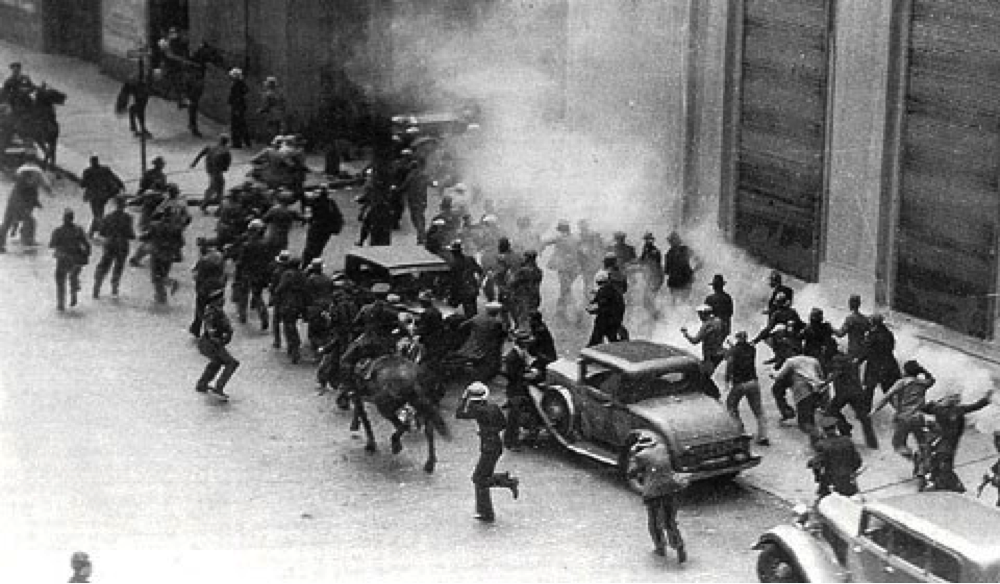


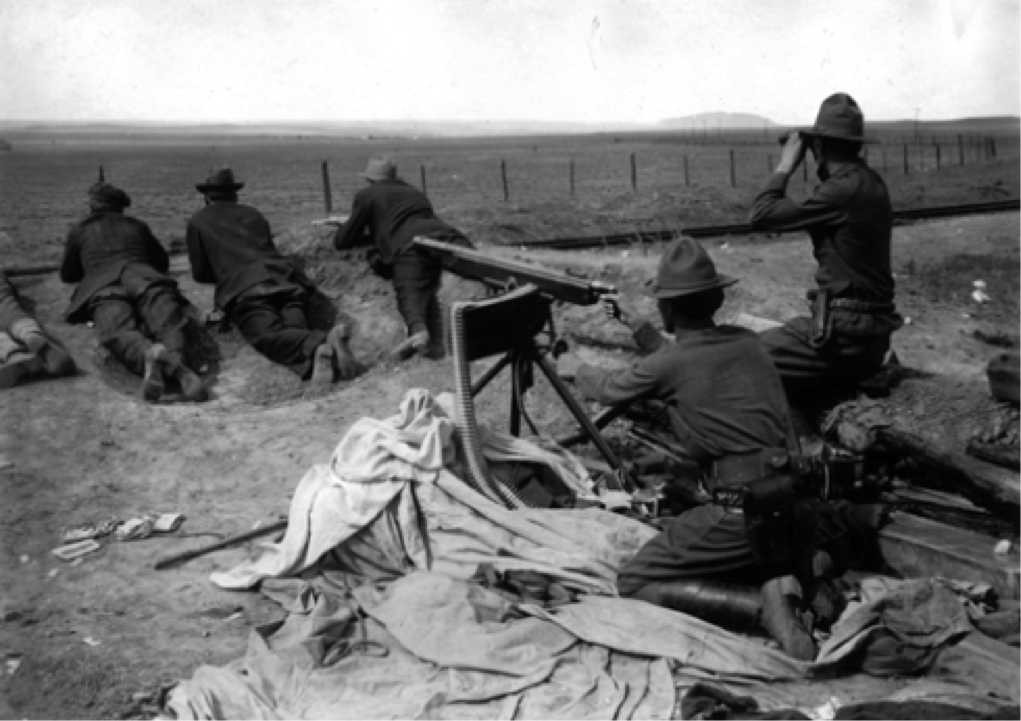
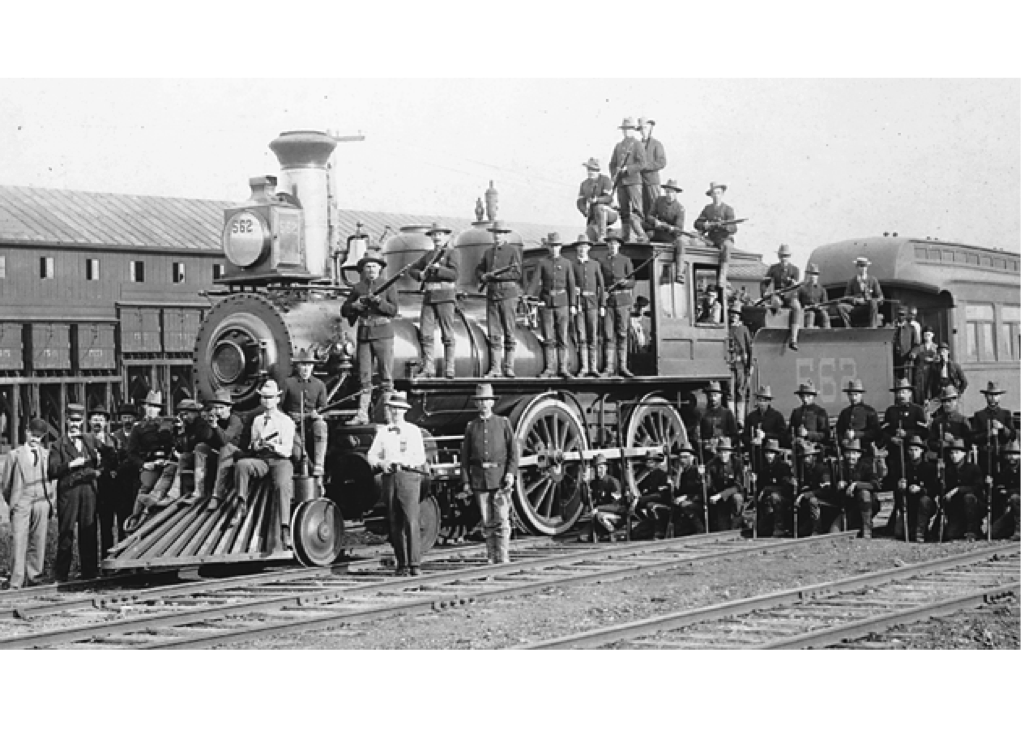

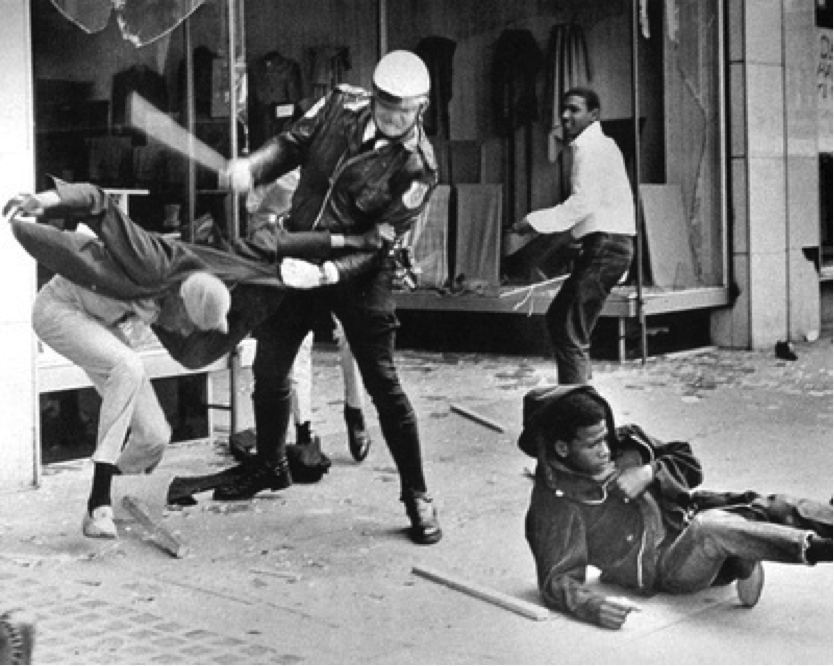
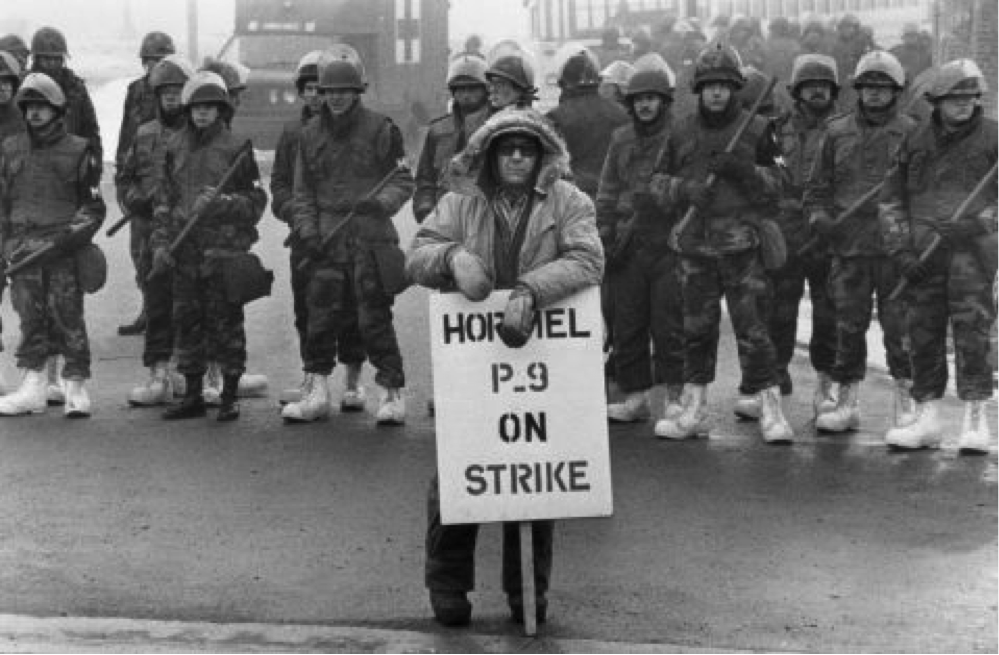

{ 44 comments }
Stan 02.06.17 at 4:57 pm
“None of the significant costs of a general strike are worth it if it’s just a grand gesture of refusal.”
I’m not sure I agree, but of course it depends on what those costs are likely to be. I participated in the women’s march on DC, and with hundreds of thousands of people in the streets, there was no violence and no arrests. It was similar across the US – very large protests….no violence.
A grand gesture of refusal sounds pretty fucking good to me. I DO refuse to go along withe the very long list of Trump crimes.
“But what is the point of the proposed general strike? ….. we can have Pence?”
That would indeed be progress. Pence’s views on most issues are much worse than Trump’s, but, he would not have a fraction of the independent political power Trump currently has.
Also too, we can follow up on our successful toppling of the trump regime by toppling Pence.
Buy 2018, if* we survive, we can put Nancy Pelosi in the white house. She’ll be next in line by then.
* I admit this is a big ‘if’
Jake Gibson 02.06.17 at 5:13 pm
You would see hardly any support in the majority of states that voted for Trump.
As in the “hard hats vs. hippies” during the anti-Vietnam War movement. The primary reaction would be to help squash the movement. A truly disappointing number of people here in Kentucky support Trump and might even be happier with Pence.
ascholl 02.06.17 at 5:53 pm
I find this piece a little befuddling. It starts out with a genuinely valuable historical synopsis, but the conclusion seems all out of proportion to the facts presented. It seems to me like the obvious conclusion is that the proposed action that people are referring to as a ‘general strike’ has only very slight resemblance to historical general strikes, and a ‘real’ general strike would be a much more serious undertaking. Once you recognize that, all the other hand-wringing is pretty irrelevant: if the proposed action isn’t a massively dangerous & difficult endeavor, it’s probably ok that there isn’t a disciplined organization w/ a concrete goal. Disconnected, unorganized organizers _aren’t_ calling for workers to put their neck on the line for no good reason. And as it self-evidently isn’t the result of a radicalization of ‘existing patterns of resistance by the working class’, perhaps it’s an early, imperfect stab at establishing</em said patterns for resistance.
Placeholder 02.06.17 at 6:17 pm
Astonishingly A. C. Gralying has been trying this on too.
http://www.independent.co.uk/news/uk/politics/a-c-grayling-general-strike-brexit-coup-parliament-vote-article-50-bristol-interview-remain-eu-a7527831.html
Chip Daniels 02.06.17 at 6:20 pm
This is a well written essay.
One thing I have noticed about the modern progressives, is the lack of awareness of how much preparation and training and discipline is involved in resistance.
I noticed this when I worked in a local Occupy group, that there was a general view of insurrection and resistance that appeared to be lifted straight out of Les Miserables. It was rooted in a highly romanticized version of history in which the proletariat just suddenly and spontaneously rises up without any forethought.
I attended a training session held by SEIU, which countered that exact problem, where they noted that Rosa Parks was not just some random woman who suddenly decided to not move. She was a trained activist, and they had planned her protest long in advance as a test case.
Sandwichman 02.06.17 at 6:52 pm
This is a thoughtful and well-informed essay. The historical background is important. For one thing, it may help to dispel the misleading cries about the intrusion of a presumably un-American “fascism.” Violent repression of labor activism is as American as cherry pie. But Gourevitch’s point is NOT that a general strike is too risky to consider.
It is that because it is so risky, it cannot be taken lightly.
As to what should be that recognizable goal. I have a few suggestions:
Those two slogans are shorthand. They refer to a complex analysis, not to just whatever image or association is evoked by the words in the phrase. Abolishing the wages system and direct democracy are processes that both require a nurture a corresponding mentality.
Dwight Cramer 02.06.17 at 7:28 pm
This is a good essay and a great discussion.
To pick a nit with the original post, if you look at labor violence around the world, I think you’d be really, really hard pressed to argue that the United States has the world’s most violent history of labor relations. ‘Labor relations’ in places like Germany in the early 1920s, Spain during the Republic and Petrograd during WWI make the American history of repressing worker’s rights look pretty tame.
If people want to call the next wave of protest a General Strike, that’s fine. But it won’t be the real thing. The ground work hasn’t been laid. The country isn’t ready. The current regime hasn’t dug itself a deep enough hole (so far, it’s only making unforced errors, we’ll seen what happens when it has to respond to a crisis). The state security apparatus hasn’t made serious misstep (think Kent State or worse). The polarization is latent and incipient, but not yet in full bloom. And are we playing just to get rid of El Caudillo de la Basura Blanca or are we playing for more?
rootlesscosmo 02.06.17 at 7:30 pm
A small correction to a piece I generally agree with: Howard Sperry and Nick Bordoise, the two workers killed in the 1934 San Francisco labor actions, were supporting the longshoremen’s strike; the General Strike came in response to the killings. But that detail actually supports the general thrust of this piece, because the general strike was an official action of the San Francisco Labor Council, the official A. F. of L. body in which all the unions participated; it didn’t arise spontaneously (through it drew in wider support from non-union San Franciscans) or at the urging of well-meaning people outside the labor movement.
bob mcmanus 02.06.17 at 9:22 pm
As much of a question as a statement, but as far as tactics go, and I need to read more, but precisely because of the problems discussed in the post tiqqun, Theorie Collective, Endnotes etc have been calling not for mass demonstrations, street actions or riots but for quieter less visible and targetable methods of disrupting production. The operative term is desertion-in-place and might involve using sick days, taking vacation days, slowdowns, and simple inactivity in the workplace, going “Bartleby.” Refusal and refusal to work. Sabotage in the workplace, subversion like the National Weather Service employees downloading and storing, perhaps disseminating materials. Accidentally rebooting computers. Cutting cables and wires. Spilling coffee.
Just staying home.
The idea of the strike is to disrupt production and increase costs of neoliberal management.
Rather than simply saying “a General Strike is this and will fail” I would rather discussions start about tactics a little less Quixotic than gathering in the square and waiting for the machineguns.
bob mcmanus 02.06.17 at 9:42 pm
Oh, Gene Sharp of course, for a start. And Weapons of the Weak I would also look to the decline and fall of the USSR and Eastern Bloc.
And “wait until we get organized, with leaders, and org charts, and agendas, and etc” then we will gather in a show of force and they will bomb us with planes sounds almost deliberately counter-revolutionary.
“Here is stuff you can do, tools you can use, you don’t need to wait on permission or social consensus” is the directly democratic unmediated revolution I am looking for.
djw 02.06.17 at 9:42 pm
Great post, Alex.
oldster 02.06.17 at 10:18 pm
Nice history lesson. But I’m not sure how it applies to the current plans from the organizers of the Women’s March for an event called “General Strike: A Day Without Women.”
This is a one-day (or less) action. To that extent, it is unlike the strikes of old that were intended to last until particular demands were met.
Do you think that the National Guard is going to set up machine-guns in front of every nail salon? At the corner 7-11? On Wall Street, to keep the accountants at their desks? In the universities, to force the lecturers to lecture?
Do any of your objections apply to a one-day walkout by women?
I’m a big fan of history. And you (and Erik Loomis, at LGM, who agrees with you) know a lot more about history of the labour movement than I ever will.
But this still feels a bit like scare-mongering. I just don’t see the National Guard bringing out the tanks for what will be in essence another Women’s March.
Aardvark Cheeselog 02.06.17 at 10:53 pm
Stan @1:
The women’s march, while a great success on its own terms, did not involve fucking with anyone’s income stream.
Pavel 02.06.17 at 10:57 pm
@Sandwichman
Your caveats aside,
1. The issue isn’t wage labor, it’s unregulated wage labor. In countries with better labor laws and social safety nets (single payer health care, etc), wage labor isn’t the direct route to poverty that it is in the US. I don’t see this as an issue that a majority of Americans would be able to get behind.
2. Direct Democracy (if referendums are anything to go by) is a terrible system (despite my personal support for digital direct democracy in the future). There are lots of arguments for why you need more or less competent intermediaries to aggregate wishes and make compromises. In fact, the Brexit vote should show you that demagoguery is a real and tangible problem regardless of whether you opposed Brexit or supported it because neoliberalism. It may, in fact, be impossible to implement effective DD in the modern world, given the enormous amount of information required to make any decision of significance. I would say a more valuable concern is getting money out of politics, particularly in the US, where it perverts most political actions.
@Rest
I’m not certain the lessons of history are entirely applicable to today’s strikes. One issue is identity. Who is a potential member of the labor movement you would plan to organize? In 1972, manufacturing made up about 24% of all labor in the US. Today it is less than 9% and dropping. Even the service sector, which has hoovered up the majority of those manufacturing jobs, isn’t composed uniformly of wage-slaves (thanks Shadowrunâ„¢) performing manual labor. The number of desk jobs has increased significantly and will continue to rise even in the service sector. Previous definitions of labor focused on *physical* labor, but those sources of shared identity are disappearing. It’s no longer possible to appeal to a “working class” not because they’ve been oppressed (they have), but rather because they’re no longer as potent a force in national industry.
To create an effective labor movement, you may need to attract those sympathetic to the cause, but currently working in traditionally-defined managerial, mixed-responsibility or white-collar jobs. For many more US citizens, labor isn’t a static dichotomy between workers and management, it’s a fluid system with a variety of concerns and issues (and the looming possibility of the elimination of all work by automation) that don’t easily lend themselves to the kind of unity previous labor movements could have relied upon. This may require generating a more tailored and up-to-date message.
bruce wilder 02.07.17 at 12:06 am
Someone is out of power and is not happy about it. Who would they be? Not the working classes — the actual workers are always out of power. Someone else. Such a mystery.
Gareth Wilson 02.07.17 at 1:17 am
I wish people would remember that the Les Miserables revolution failed.
Sandwichman 02.07.17 at 1:29 am
Pavel @14 My “caveats aside” I have no argument. The essence of my argument is IN my caveats. The link attached to my name goes to a post at EconoSpeak in which I discuss General Strike and Recall and in that post I link to two earlier posts in which I elaborate on the abolition of the wages system and on direct democracy.
When you say, “the issue isn’t wage labor, it’s unregulated wage labor,” that’s not really that much different from what I am saying when I refer to abolition of wages system. The one additional caveat, though, has to do with what kind of regulation and by whom. Collective management of work by workers IS abolition of the wages system.
I am all for getting money out of politics. Direct democracy certainly has its risks — as does, for that matter, a two-party gerrymandered first-past-the-post electoral college system. The ideal put forward by the Populist advocates of direct democracy was that participation in initiative, referenda, recall and proportional representation would educate the voters. That’s the ideal. I can’t give any guarantees.
heckblazer 02.07.17 at 1:35 am
I only recently stopped being one of the long-term unemployed by getting a job waiting tables at a restaurant. Not showing up for work as part of a general strike runs a good chance of me getting fired and being unemployed again. What specific, concrete gains will joining the general strike get me to offset that?
derrida derider 02.07.17 at 2:39 am
“This isn’t just distant history. On March 10, 1968, Martin Luther King Jr. …”
Sorry dude, that IS distant history. MLK’s call for industrial organisation was mildly anachronistic then; it is totally anachronistic now. Anyone calling for “a general strike” these days is off with the fairies as it is an approach completely at variance with the way the putative strikers – the great mass of people – live and think.
I think any strategy to deal with Trump should have two main aims; to keep him from starting wars, and to make sure his voters understand they were conned so as to limit his period of worst damage to just two years (until the mid term elections). Long drawn out fights over such things as his attempt at repeal of Dodd-Frank (remember how damaging Hillary’s Wall St speaking tour was), for example, will be much more effective at the second than fantasising about how the AFL-CIO might bring him down.
Ignore the bunga-bunga and the routine personal thieving; his supporters clearly just don’t care about that (evangelicals, remember, voted for him) and it is anyway not what will do USAnians and the world the most harm.
J-D 02.07.17 at 2:52 am
bruce wilder
Your logic is faulty. The statement that the workers are always out of power is logically compatible with the statement that the workers are out of power and not happy about it (that is, they could both be true); therefore, the statement that the workers are always out of power is not any reason to doubt that the workers are unhappy about being out of power.
Faustusnotes 02.07.17 at 4:10 am
J-D, Bruce wilder believes trump put the workers back in power, so debating his logic probably isn’t going to work.
Waiting for Godot 02.07.17 at 4:25 am
It is precisely because of the United States’ violent labor history that we must organize nationally and create a strike that mobilizes everyone. It is NOT just union rights that a general strike would be advancing but would provide cover for all workers to join the movement for a new politics and economics. We must remember that if it were not for the blood spilled in major strikes in the 30’s we would not have had the entirety of the New Deal. And right now organizing a general strike behind the women’s movement and the immigrant rights movement would make it very difficult for the militias of the ruling class, police and National Guard, to play the role they have in the past if the constituency in the street is not one recognizable and alienable group but the entire neighborhood.
bruce wilder 02.07.17 at 4:34 am
J-D
My point was that I do not think the passionate reaction to Trump is coming primarily from a class of people ordinarily much in sympathy with the working classes, let alone themselves forming a genuine part of the downtrodden masses. I think it comes from people who “normally” expect their cultural concerns and commitments to be honored by those in power, in a form of class solidarity to be sure, but not one extending very far down the status hierarchy.
I am suspicious of people who protest Trump, but spent 8 years in uncritical acceptance of Obama.
Francine Prose, former president of PEN American Center and a member of the American Academy of Arts and Letters and the American Academy of Arts and Sciences, has struck a blow for liberty by deleting Uber and adding Lyft to her smart phone. And then writes about it in the pages of the Guardian! It’s self-parody by the terminally self-involved.
J-D 02.07.17 at 5:30 am
bruce wilder
That’s seriously unclear. Which people are you talking about? and which reactions, for the matter of that? Lots of people have passionate reactions to Trump, but they aren’t all the same passionate reaction. If you mean to refer more specifically to the people participating in recent protests, it’s close to certain that they have different reasons for protesting and that they have different class/status/cultural backgrounds.
Again, that’s seriously unclear. Do you mean everybody who’s now protesting against Trump, or only some specific subsection of the protesters? But then, which ones? And whomever you mean, how do you know that they spent eight years in uncritical acceptance of Obama? Do you mean only that there weren’t the same kind of protests against Obama as there have been recently against Trump? and what is it that you suspect people of, whomever it is you’re referring to?
That’s clear enough. The article could easily be as silly as you suggest, although not having read it I can’t say for sure. But even if it is, I don’t understand why you would suppose that Francine Prose is typical of the people protesting against Trump.
Pavel 02.07.17 at 5:47 am
@Sandwichman
I accept that those statements are too broad without addressing the caveats. However, I do take issue with the notion that “proportional representation would educate the voters. That’s the ideal. I can’t give any guarantees”. Given the number of guarantee-free systems where things are supposed to work themselves out (without obvious incentives), tried and failed in the 20th Century, I’m going to have to ask for you to show us your proofs. You can’t leave this as an exercise for the reader. The Parliamentary version of first past the post and single transferrable vote works relatively well in Canada and Australia, allowing for the existence of both radical and centrist parties. The US system is in need of serious reform, but jettisoning alternative functioning political systems in favour of “no guarantees” isn’t going to stick well with the public.
As for Marxist economics, I’m just dying to revisit the Labor Theory of Value. I guess another way to frame it is that you can use different methods of wealth redistribution without altering the nature of labor relations (or this is what the majority of Americans would be interested in anyway).
@heckblazer
I would avoid any situation you can’t walk away from to fight another day. If you have a chance to join a peaceful protest that isn’t likely to get you in much trouble, go for it.
@bruce wilder
“has struck a blow for liberty by deleting Uber and adding Lyft to her smart phone.”
While certainly satirical in some ways, this comment ignores the power that consumers have in shaping the actions of non-gov agents. North Carolina took a severe beating economically, and served as an example to other states of how further anti-Trans laws were going to play out (this was in the pre-Trump era, however). Other corporations have made some efforts to preserve an ethical status with their workers and consumers. It’s just another tool in the toolbox after all.
It’s fine to criticize the distant liberal elite multi-class (or something, you didn’t quite clarify which class you were referring to, mages perhaps) for their self-absorption and aloofness. It is also impossible to deny the fact that it was the very same people who advocated for accessible health care and higher minimum wages. Both policies have throughly positive outcomes for the poorest in US society.
faustusnotes 02.07.17 at 6:17 am
Yes J-D, in Bruce Wilder’s world the 10 million new recipients of Medicaid are all from the ruling class.
MFB 02.07.17 at 7:23 am
Calling for a general strike, when what you mean is that some middle-class Democrats should stand around and protest for a day or so, is poisonous misuse of language at best.
Taking such poisonous misuse of language seriously by talking about real labour unrest of the past is rather silly. How could one possibly associate today’s Democratic Party with the working class? It would be like associating today’s Republican Party with trustbusting.
Bruce Wilder makes a lot of sense.
dbk 02.07.17 at 12:45 pm
I’ve recently begun following cabinet-level appointments and their progress through Senate committees, in particular those for the positions of Sec of Ed and AG.
The public’s response to the nomination for Sec of Education has been overwhelming, literally. This is, of course, not a strike, but rather a mass popular uprising conducted largely, though not exclusively, by correspondence and phone: over 1.000.000 letters/messages as of last week had been received by Senators of BOTH parties, and most Senators’ phone mailboxes have shut down.
This nomination may have been a test-case for how far the R’s could go on cabinet nominations, or it may have been a decoy nomination to allow other nominees a less-impeded path to appointment – I can’t quite figure it out. Be that as it may, somebody on T’s nomination team forgot that 87% of the American public send their children to public school – or perhaps, they figured nobody was paying attention. Oops.
Imagine what the public response will be to calls to rescind the ACA. Over the weekend, a Republican Representative from the most conservative district in CA required a police escort to depart a town hall meeting to discuss the Republicans’ plan to do – something or other (what?) – with the ACA. His colleagues are cancelling similar meetings in their own home districts, but avoiding one’s constituents can’t go on indefinitely.
Can anyone imagine the public response a couple years down the line it the Republicans go after Medicare? Or (the great prize) Social Security?
My point being, a General Strike will not IMHO be necessary.
bob mcmanus 02.07.17 at 4:28 pm
Quoteboy strikes again. Richard J. White and Colin C. Williams from Ch 52 in the Routledge Handbook of Neoliberalism
1) I know the OP was about resistance and the General Strike, but any radical forms of resistance will need support structures, partially addressed in the OP, that are less easily accessed than the old Union Strike funds. Think alternative, informal, and underground economies. I disagree with the OP and others in that I don’t think the support structures, any more than the direct action, needs to be or can be organized in the same Fordist mass mobilizations of the previous century.
2) I also realize that most of the “resistance” at this point can be better characterized as anti-Trumpism than anti-capitalism or anti-neoliberalism, and will likely be fully satisfied with a return to Obamism, Clintonism, or perhaps Bookerism. See Wilder at 23. I have little to say to such people.
Sandwichman 02.07.17 at 4:34 pm
Pavel @ 25 There are books and journal articles that chronicle the impacts of recall, initiative and referendum, warts and all. I am not suggesting a panacea. Parliamentary systems are, generally speaking, more democratic than the U.S. system. There are quite a few with proportional representation of some sort, which is a direct democracy innovation. I am not interested in Utopias just what works and what might work better.
As for “Marxist economics,” there is no such thing. There are economists who call themselves economists but that is not the same thing. What Marx wrote was CRITICISM of political economy and the labor theory of value was an integral part of classical political economy. Despite protestations to the contrary, neoclassical economists atavistically revert to “the laws of political economy” when backed into a corner. “Opportunity cost” hangs on the thread of a Walrasian “leisure device” that homogenizes unemployment, time off work and the idleness of coupon clippers. It’s all “leisure” and giving it up is the opportunity cost of working for wages.
bruce wilder 02.07.17 at 4:58 pm
J-D @ 24 I do not find your style of argument, demanding literalism and minutiae as if logic requires them, to constitute a critique I want to engage. You seem to think I should furnish a catalog of protesters and their individual views in the interest of an ersatz clarity. But, the person I do mention — one named in the OP as an initiator of the call for a general strike — well, you hadn’t clicked the link in the OP or read her brief essay, so you do not know why I would take her as representative. I do not want to play your game.
Pavel @ 25
“It is also impossible to deny the fact that it was the very same people who advocated for accessible health care and higher minimum wages.”
Is it impossible? I wonder about that.
“I was raised Catholic, became Episcopalian & found out later my family was Jewish. I stand ready to register as Muslim in #solidarity,” tweeted Madeline Albright, the Secretary of State who thought the half million Iraqi children sacrificed to her sanctions regime satisfied cost-benefit criteria.
North Carolina’s state government has been in the grip of a small group of ruthless wealthy businessmen for a number of years. I suppose the extreme gerrymandering they have used to secure their power against the unpopularity of their economic policies might be an issue for some, but the really critical thing is trans use of bathrooms.
In the last election, the disproportion of Republican Senate seats being contested led many Democrats to anticipate taking a Senate majority. The chairperson of the Democratic Party, whose unrelenting advocacy for the poor led her to seek exemptions from Federal regulation for the payday lending industry of her State, created a scheme for the leading Democratic candidate for the Presidency that allowed that tireless advocate for the poor (and the children, never forget the children!) to circumvent campaign finance laws that candidate nominally supported to raise vast sums from very rich people, but to drain those funds away from the state Parties into her own campaign, where she spent a billion dollars and could not defeat a reality teevee star with orange hair. Who needs conventional political power when they can wear a pink pussyhat?
I think a politician can play an advocate for accessible health care and a higher minimum wage on teevee without actually working to empower ordinary people — I say that exactly describes Obama. The illusion of Obama as a progressive became the “normal” politics of a lot of people, an illusory standard by which they judged the dynamics of American politics thru a long economic recovery in which lots of folks never recovered and life expectancy actually declined for huge swathes of the population. So, we see lots of people complaining that Trump and his politics is not normal, hurling criticisms at Trump for policies not so different from what Obama was doing. Like Obama did not keep the country at futile wars for his entire Administration, did not deport two and half million undocumented immigrants, did not murder children by drone, and so on. Or, people who are exercised about emoluments, but never saw any problem with a Secretary of State trailed by a husband soliciting contributions for his Foundation from governments . . . .
For a generation or more, the leadership of center-left politics has been in the hands of neoliberals nudging us in directions destructive of many left-liberal values and (most importantly) the apparatus of political power to oppose the domination of the state by the wealthy, large business corporations and the financial sector. That a plurality is now reduced to protest and with very few reliable hands on levers of institutional power is a product of their years of amoral incompetence in power and leadership. I cannot but think the popular support for that leadership has rested in a kind of class consciousness among those among the professional and managerial classes, who have prospered at the expense of those farther down the economic hierarchy. There is a lot of class contempt evident to me in the ready charge of racism hurled against the discontented, and the idea that the Russians stole the election requires heroic effort at self deception.
Suzanne 02.07.17 at 6:05 pm
“perhaps it’s an early, imperfect stab at establishing</em said patterns for resistance."
I would tend to agree with the quote above from ascholl a@3. I agree that we are nowhere near conditions for a general strike as traditionally understood, and I hope we never get there, but I see no reason to dismiss the idea out of hand with a casual swipe at out-of-touch activists, which isn’t worthy of an otherwise excellent OP. The 2006 immigration reform protests in the U.S. may serve as a more immediate and appropriate example.
"What, so we can have Pence?"
There’s a real argument that it’s better to have Pence in charge rather than Trump, if only because he is a more stable personality. I don’t think it has yet sunk in how dangerous it is to have Trump wandering around the White House, brooding late at night over the cable news he watches endlessly when he’s not pondering window treatments for the Oval Office or yelling at his tiny staff. The downside is that Pence is more competent than Trump, admittedly not a tall fence to jump, and would presumably be able to implement the Republican agenda more efficiently, but we’re talking about the nuclear button here.
However, such talk is pretty far-fetched. I think we’re in for the full four years of Trump, in which case some kind of “generalized no†to the agenda of Trump and the right wing may well be in order at some point.
J-D 02.07.17 at 11:31 pm
bruce wilder
If you had made no response to me at all, I would have guessed that you did not want to engage with me. It is not clear to me what purpose is supposed to be served by an explicit announcement that you do not want to engage with me.
No, that’s the reverse of the truth. You have already supplied ersatz clarity, amply; what I am seeking is the real thing.
I have now read Francine Prose’s essay. I still don’t get why you would take her as representative — she doesn’t suggest in the essay that she is representative.
On the other hand, having read the essay I now understand why she deleted Uber from her smartphone, and it seems to me she had good reason. You wrote that she ‘struck a blow for liberty by deleting Uber’ as if she had portentously misrepresented the significance of her action, but on reading myself it appears to me that she represented her action in appropriately modest proportion, so it seems to me that the distortion of perspective is yours, not hers.
It is far from being news to me that many people do not value precision as highly as I do.
bob mcmanus 02.08.17 at 12:42 am
1) If we are talking about resistance I strongly recommend in an age when the concentrated labor sites of the Fordist Age have disappeared, I strongly recommend Steve Fraser’s recent Age of Acquiescence. It could be that a Gompers-Knights of Labor craft union model is now more appropriate. Fraser is also inspirational on direct action, talking at length about the Great Southwestern Railroad Strike of 1885 I think.
2) I cannot emphasize enough the “Big Sort” analysis of current politics. America is radically split urban-rural: not only the metropolitan coasts, not only the big 5 cities in Texas, but fractally all across America.
I checked out Iowa, which Trump won by ten points. However, not only did Clinton win Des Moines, but Clinton also won the cities of Davenport, Cedar Rapids, Waterloo, and…Nevada. Nevada is the south side of Ames, which has apparently sorted itself into a blue and a red half. I suspect if I spent another hour I might find Clinton competitive in even more cities. Indiana, one of the reddest States, had four metropolitan counties that went for Clinton.
In other words, the Big Sort is not only national, but effected in every state, and many cities over 20,000 population in very Red States are blue or purple. These cities can be a base for a Progressive National Politics, because we need a National Politics.
We are in a radically geographically distributed Civil War. This is likely to get even worse in the Trump era. Progressives are likely to run from Red America in droves.
3) So…Anarchism? Can the cities somehow effectively separate themselves, as sites of Anti-Trump resistance and medium term self-sufficiency and independence from both Trumpist America and their Republican State gov’ts? Unlikely.
Current exemplary moments of resistance include of course North Carolina and LGBTQ city laws; Minneapolis and paid-leave; Austin fighting to maintain its status as a Sanctuary City. All are being quashed by State Govts.
Anarchism, devolution into City-States, can be a Utopian goal, but runs up against structural constraints particular to America. Space, land, geography, the rural has a disproportionate amount of political power compared to cities, both nationally because of the Constitution and state-wide because of Supreme Court precedent and the systems of funding that sends money to the Federal Gov’t and back to States, not cities. There is no progressive or Democratic path, under Big Sort tendencies, to change those facts. Quite the opposite, the loss of state legislatures makes Constitutional Amendments possible that are terrifying.
So…just a dream. 3-5 million blue refugees to New York or California might give us a couple more representatives. Those same refugees to Texas could flip the state blue, give us 10 more representatives, two more Senators, and an electoral college lock on the Presidency.
bruce wilder 02.08.17 at 5:47 pm
The urban-“rural” divide is a perennial of American politics at least since big cities besides New York and Philadelphia began to emerge in the latter half of the 19th century and competed with the north-south and east-west divisions. There’s no particular reason that the big cities should concede control of the States, nor any reason that small cities should remain red as they grow larger.
The problems of partisan polarization have much more to do with extreme income inequality and the desire of the political classes of the Media and the Parties to be brokers, mediators and sheep herders for the plutocracy than with demographics or geography. What stands in the way of either Party strategically morphing its ideology are the hazards to that way of political life that feeds the political classes from above and manipulates the masses below.
Protest, for the moment, is a way to continue to divert political participation by the left into channels where it cannot claim a share in governance or make demands that might be satisfied at the expense of the parasites that fund the Democratic Party’s centrist establishment. We must demonize the Trump and his Trumpets (as if his actual absurdity is not enough) lest we see some sense in their discontent. But, never consider for a moment the possibility that a Party that can claim a plurality in the country might actually seek to govern.
Sandwichman 02.08.17 at 11:39 pm
bruce wilder @ 35:
“Protest, for the moment, is a way to continue to divert political participation by the left…”
Divert… from what?
J-D 02.09.17 at 3:58 am
bruce wilder
You don’t like minutiae? Here are some broad generalisations.
United States administrations, both Democratic and Republican, have done many terrible things, both domestically and internationally, over many decades.
There are many people reacting with a justified outrage to actions of the present Republican administration who have somehow overlooked past outrages by Democratic administrations.
Checking some of the outrageous actions of the current Republican administration would be insufficient to achieve the goal of a drastic transformation in the United States of the kind that would produce radical and lasting improvements.
Checking some of the outrageous actions of the current Republican administration would still be a worthwhile achievement.
Democratic administrations, although they do terrible things, are generally less terrible than Republican administrations and for that reason worth voting for.
Pavel 02.09.17 at 7:52 am
@bruce wilder
Wow, you brought out all the artillery for this one. Ok, here goes.
“who thought the half million Iraqi children sacrificed to her sanctions regime satisfied cost-benefit criteria.” I doubt the statistics here but even if true, does the state of Iraq under Saddam bear no actual or significant moral responsibility? I guess if he had spent less time gassing the Kurds, he could have actually bothered to feed his own population (did we all forget that he used neurotoxins to wage the most vile kind of chemical warfare against civilians?). I feel like this is the same kind intellectual honesty that was prevalent with mostly British historians in the 50’s and 60’s, publishing endless accounts of the Soviet Communist Party that also for some reason omitted any mention of Trotsky.
“I suppose the extreme gerrymandering they have used to secure their power against the unpopularity of their economic policies might be an issue for some, but the really critical thing is trans use of bathrooms.” Hey, I know what we should do! We should ignore the plight of minorities and make sure to once again focus on the only people who matter: white working class men. Admittedly, many leftists see gerrymandering as a serious and destructive problem, but it’s not always possible to capture the public’s imagination on such an issue. Lawrence Lessig, indefatigable advocate of electoral and political reform, ran on this exact platform and lost pretty badly.
“The chairperson of the Democratic Party, whose unrelenting advocacy for the poor led her to seek exemptions from Federal regulation for the payday lending industry of her State…”
Yes, DWS was a corrupt, kleptocratic dirtbag. She was certainly inexcusable, but it’s useful to note just how many Democrats despised her even before Clinton lost the election. Unfortunately, political apathy for Democratic voters in-between Federal elections is a weird historical quirk arising from the wholesale rejection of State-level politics and the rather short-sighted embrace of exclusively Federal-level solutions.
“Who needs conventional political power when they can wear a pink pussyhat?” And I’m sure they were all ardent DWS supporters too. This is a pretty lazy point, overall.
“Like Obama did not keep the country at futile wars for his entire Administration… did not murder children by drone…”
It’s fair to argue that Obama wasn’t the Messiah (although he did stop the Rapture somehow), but I’m pretty hard pressed to remember *any* US President who did not have blood on his hands (even Garfield, although the blood would have been his own). Kennedy gave the US some civil rights and the Bay of Pigs. LBJ gave the US the Great Society and the Vietnam War. Every President has been involved with foreign conflict in some form or another. It’s somewhat probable that the drone strategy (just like the CIA’s misadventures in the 50’s) was an attempt to circumvent having to put more boots on the ground in yet another part of the Middle East. It’s valid to point out Obama’s faults. It’s throughly invalid to see him as a having deviated outside of the historical trends for US Presidents or blame him for setting up Trump’s current policies. You can have Presidents who murder and attempt to improve civil society, or you can have Presidents who murder and also destroy civil society.
“but never saw any problem with a Secretary of State trailed by a husband soliciting contributions for his Foundation from governments . . . .” Do… do you need to watch that John Oliver clip about the Clinton Foundation to disabuse yourself of this silly notion?
“That a plurality is now reduced to protest and with very few reliable hands on levers of institutional power is a product of their years of amoral incompetence in power and leadership.” I agree that this is the current, sad state of affairs. However, to reduce the causes to a kind of a conspiracy between the centre-left and ruling elites to screw over the working class is a serious oversimplification. Not least because the (white) working class in America routinely refuses to vote for the left and hasn’t really supported them in decades.
“There is a lot of class contempt evident to me in the ready charge of racism hurled against the discontented”
Have you seen YouTube comments or Twitter feeds recently? The global rise in racism and white nationalism isn’t some kind of invention of the capitalist running dogs. There is a strong argument to be made for the idea that American racism today is just an extension of Civil War-era racism that never really went away. The white working class can be both oppressed and throughly racist. These aren’t categorical contradictions. Also, I like how this implicitly ignores the idea that a PoC working class doesn’t exist or doesn’t matter (since comments about racism wouldn’t be aimed at them). Next you’re going to tell me that charges of sexism against the discontented are just another fantasy of the centre-left conspiracy.
“the idea that the Russians stole the election requires heroic effort at self deception.” There is a significant amount of evidence that the Russians have been manipulating and influencing elections in central and eastern Europe as well. I know my peeps (they’re yellow and made of marshmallows), but it’s also not inconceivable that Russian intelligence is using cyber warfare pretty effectively outside of its normal range of national influence. Also, the numerous connections between Trump, his team (does anyone remember his former director of communications anymore? You know, the one who was removed because he engaged in blatant pro-Russian propaganda in Ukraine) and Russia requires heroic levels of self-deception to be ignored.
Faustusnotes 02.09.17 at 1:10 pm
Bernie sanders voted for those sanctions.
bob mcmanus 02.09.17 at 1:58 pm
The white working class can be both oppressed and throughly racist. These aren’t categorical contradictions. Also, I like how this implicitly ignores the idea that a PoC working class doesn’t exist or doesn’t matter (since comments about racism wouldn’t be aimed at them). Next you’re going to tell me that charges of sexism against the discontented are just another fantasy of the centre-left conspiracy.
Intersectionality works both ways, as the above paragraph acknowledges. If the Left has any credible claim to promoting egalitarianism, it must exclude as well as include. It must exclude the principled racist, fascist, misogynist, homophobic but it must also and openly exclude the rich, the capitalist, the propertied (both material and immaterial) those who accept the idea of meritocratic pay scales, the liberal and the neoliberal. And the militarist and imperialist. Otherwise it is simply an opportunism, a cynical preservation of existing exploitative structures in order to only change the players who benefit from them.
I can accept putting race and gender (etc) front and center over class if and only if the representative figures of liberation are not themselves rich, on the way and desiring of wealth, or servants of the ownership class. This should be hard in a society where 80-90% of people are not rich. Obama and Clinton represent their class, or aspirations to class mobility, not their race or gender. Those who think otherwise are deluded by false mythologies of meritocratic egalitarianism. Or simply cynical.
bob mcmanus 02.09.17 at 2:20 pm
Correction: “This should not be hard in a society…etc”
And not at all incidentally, the exclusion of the rich, the propertied, and those seeking wealth from intersectional Leftism has the profound and inevitable consequence of increasing diversity and its populist foundations, broadening and increasing its base and pools of talent, since wealth and power are currently so unevenly distributed toward the older, whiter, and male.
A “Left” that draws on or accepts its models, representatives, and leaders from elites, economic or otherwise, is prima facie oxymoronic, self-contradictory, and deliberately impotent.
J-D 02.09.17 at 8:16 pm
bob mcmanus
By this logic the Left would have to exclude Friedrich Engels.
Stephen 02.09.17 at 9:10 pm
Bob McManus: “A “Left†that draws on or accepts its models, representatives, and leaders from elites, economic or otherwise, is prima facie oxymoronic, self-contradictory, and deliberately impotent.”
So much for the elite-derived Clement Richard Attlee and, come to think of it, Vladimir Ilyich Ulyanov.
Pavel 02.10.17 at 6:09 am
@bob mcmanus
“It must exclude the principled racist, fascist, misogynist, homophobic but it must also and openly exclude the rich, the capitalist, the propertied (both material and immaterial) those who accept the idea of meritocratic pay scales, the liberal and the neoliberal.”
I think you’re confusing ideologies with states of being, although I guess in your worldview states of being are ideologies so long as they arbitrarily shunt you into some category or other. I guess in that view, professionals who actively fight for the causes of the discontented but make in excess of 250, 000 dollars are persona non grata.
Also, I guess we hate meritocracy now? I mean, isn’t the issue with the ultrawealthy that they defy meritocracy by earning in significant excess of any social contribution they could possibly be making. Please don’t confuse the fig leaf of meritocracy used by the bullshit peddlers of modern capitalism with the actual concept of social or relative usefulness. Hey, didn’t the USSR attempt to implement meritocratic pay scales for workers in an attempt to incentivize them to work harder? Why? Because incentives have the power to change people’s behaviour (hint: that’s not a bad thing).
“A “Left†that draws on or accepts its models, representatives, and leaders from elites, economic or otherwise, is prima facie oxymoronic, self-contradictory, and deliberately impotent.”
Are we talking about intellectual elites as well? Anyone who has popular support or adulation? Professionals? Anyone who has mastered any field whatsoever?
“the liberal” So, exclude everyone then.
Comments on this entry are closed.